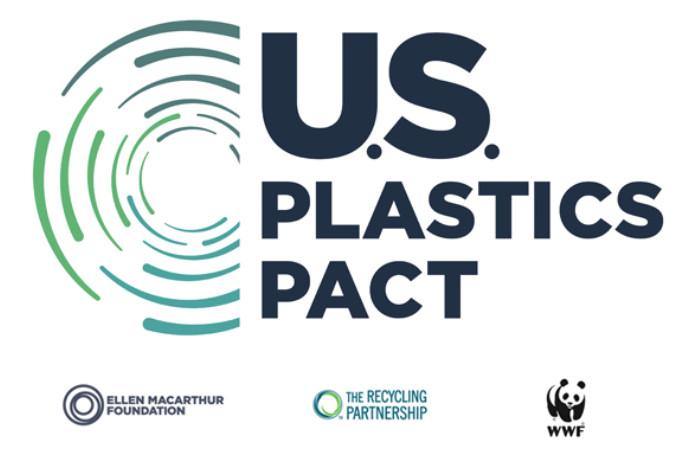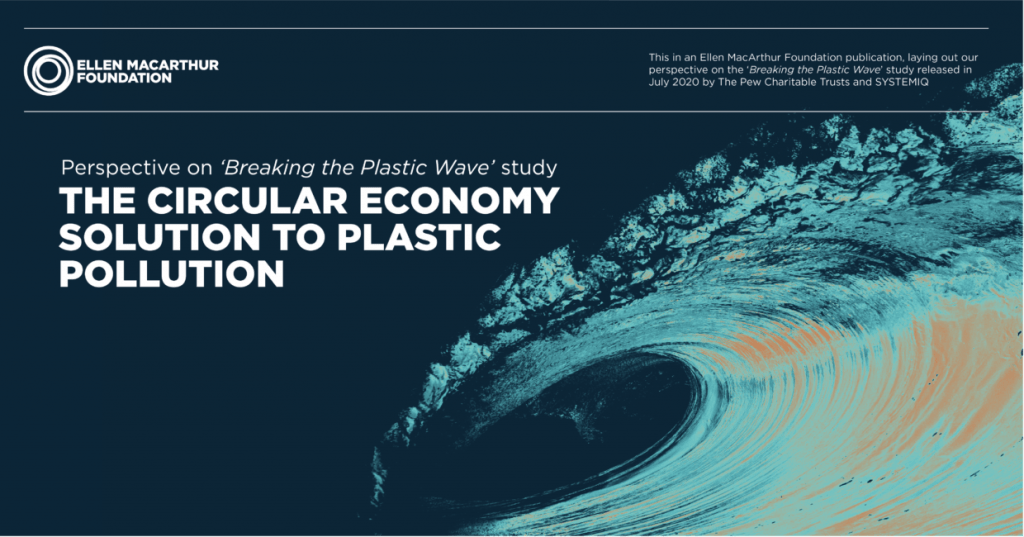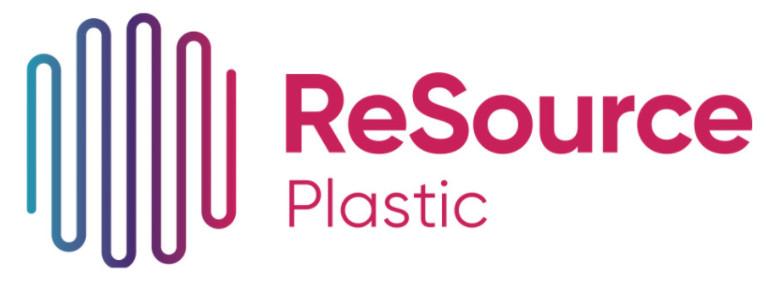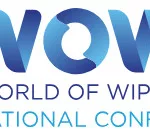 60+ Brands, Retailers, Government Agencies, and NGOs Collaborate to Advance All Plastic Packaging to become Reusable, Recyclable, or Compostable by 2025
60+ Brands, Retailers, Government Agencies, and NGOs Collaborate to Advance All Plastic Packaging to become Reusable, Recyclable, or Compostable by 2025
Press Release
Falls Church, Va., (August 25, 2020) – Today, the U.S. Plastics Pact, a collaborative led by The Recycling Partnership and World Wildlife Fund (WWF), launched as part of the Ellen MacArthur Foundation’s global Plastics Pact network. The U.S. Plastics Pact is an ambitious initiative to unify diverse public-private stakeholders across the plastics value chain to rethink the way we design, use, and reuse plastics, to create a path toward a circular economy for plastic in the United States.
U.S. industry leaders recognize that significant, systemwide change is needed to realize a circular economy for plastic; individualized action isn’t enough and thus, The U.S. Plastics Pact brings together companies, government entities, non-governmental organizations (NGOs), researchers, and other stakeholders in a pre-competitive platform for industry-led innovation. The U.S. Plastics Pact will drive collaborative action and deliver a significant system change toward a circular economy for plastic, enabling companies and governments in the U.S. to collectively meet impactful goals by 2025 that they could not otherwise meet on their own.
 “Together, through the U.S. Plastics Pact, we will ignite systems change to accelerate progress toward a circular economy,” says Sarah Dearman, VP of Circular Ventures for The Recycling Partnership. “As the lead organization that engages the full supply chain to advance circularity in the U.S., it’s a natural fit for The Recycling Partnership to further collaborative action with other industry leaders to create substantial, long-lasting change for the betterment of our planet. The results from the U.S. Plastics Pact’s efforts to advance packaging, improve recycling, and reduce plastic waste will benefit the entire system and all materials.”
“Together, through the U.S. Plastics Pact, we will ignite systems change to accelerate progress toward a circular economy,” says Sarah Dearman, VP of Circular Ventures for The Recycling Partnership. “As the lead organization that engages the full supply chain to advance circularity in the U.S., it’s a natural fit for The Recycling Partnership to further collaborative action with other industry leaders to create substantial, long-lasting change for the betterment of our planet. The results from the U.S. Plastics Pact’s efforts to advance packaging, improve recycling, and reduce plastic waste will benefit the entire system and all materials.”
In line with the Ellen McArthur Foundation’s vision of a circular economy for plastic, which unites more than 850+ organizations, underpinned by common definitions and concrete targets, the U.S. Plastics Pact brings together plastic packaging producers, brands, retailers, recyclers, waste management companies, policymakers, and other stakeholders to work collectively toward scalable solutions tailored to the unique needs and challenges within the U.S landscape, through vital knowledge sharing and coordinated action.
 “Breaking the Plastic Wave brings an unprecedented level of detail into the global plastic system, confirming that without fundamental change, by 2050 there could be more plastics than fish in the ocean. To turn the tide on plastic waste and pollution, we need to radically increase our efforts and speed up the transition to a circular economy. We must eliminate the plastics we don’t need, and drastically reduce virgin plastic use. We need to innovate to create new materials and reuse business models. And we need improved infrastructure to ensure all plastics we use are circulated in the economy and never become waste or pollution. The question is not whether a circular economy for plastic is possible, but what we will do together to make it happen.” – Dame Ellen MacArthu
“Breaking the Plastic Wave brings an unprecedented level of detail into the global plastic system, confirming that without fundamental change, by 2050 there could be more plastics than fish in the ocean. To turn the tide on plastic waste and pollution, we need to radically increase our efforts and speed up the transition to a circular economy. We must eliminate the plastics we don’t need, and drastically reduce virgin plastic use. We need to innovate to create new materials and reuse business models. And we need improved infrastructure to ensure all plastics we use are circulated in the economy and never become waste or pollution. The question is not whether a circular economy for plastic is possible, but what we will do together to make it happen.” – Dame Ellen MacArthu
As of today, more than 60 Activators – including for-profit companies, government agencies, and NGOs – have joined the U.S. Plastics Pact, representing each part of the supply and plastics manufacturing chain. By joining the U.S. Plastics Pact, Activators agree to collectively deliver these four targets:
- Define a list of packaging to be designated as problematic or unnecessary by 2021 and take measures to eliminate them by 2025.
- By 2025, all plastic packaging is 100% reusable, recyclable, or compostable.
- By 2025, undertake ambitious actions to effectively recycle or compost 50% of plastic packaging.
- By 2025, the average recycled content or responsibly sourced bio-based content in plastic packaging will be 30%.
Results of measurable change in each of the target areas and transparent reporting are key outcomes of the U.S. Plastics Pact. Progress of the U.S. Pact will be tracked through c, which provides a standard methodology to track companies’ plastic footprints and publicly report on their plastic waste commitments each year. The report will be made publicly available each year.
 “Plastic pollution is a global crisis that needs local solutions, and the United States is one of biggest opportunities where regional interventions can result in transformative change around the world,” said Erin Simon, Head, Plastic Waste and Business at World Wildlife Fund. “To do this, WWF sees the U.S. Plastics Pact as the linchpin for uniting the critical stakeholders—industry leaders, waste management systems, and policymakers—under a common vision and action plan for meaningful, measurable impact.”
“Plastic pollution is a global crisis that needs local solutions, and the United States is one of biggest opportunities where regional interventions can result in transformative change around the world,” said Erin Simon, Head, Plastic Waste and Business at World Wildlife Fund. “To do this, WWF sees the U.S. Plastics Pact as the linchpin for uniting the critical stakeholders—industry leaders, waste management systems, and policymakers—under a common vision and action plan for meaningful, measurable impact.”
Achieving this vision will require new levels of innovation and collaboration from all Activators of the U.S. Plastics Pact and beyond. The U.S. Pact is launched as part of the Ellen MacArthur Foundation’s Plastics Pact network, joining Plastics Pacts in Europe, Latin America and Africa as a globally-aligned response to plastic waste and pollution that brings together shared ambition, combined expertise, and collaboration to create regional and national solutions toward a circular economy in which plastic never becomes waste.
“Every year, 8 million tons of plastic enter our oceans – that’s one dump truck every minute,” ReSource
Business has the potential to help change the trajectory of our global plastic waste crisis. But companies need assistance in turning their commitments into measurable action. That’s where ReSource comes into play. Under the leadership of WWF, ReSource brings together a consortium of companies and organizations leading the way to address our planet’s plastic waste crisis. By inspiring action across their sectors and supply chains, as few as 100 companies have the potential to prevent roughly 50 million metric tons of the world’s plastic waste by 2030. ReSource works with its member companies to maximize, measure, and multiply their impact on solving the plastic pollution crisis.
 Plastic doesn’t belong in nature. It impacts wildlife, waterways, and oceans in ways we are just beginning to understand
Plastic doesn’t belong in nature. It impacts wildlife, waterways, and oceans in ways we are just beginning to understand
 “This is an exciting step on the journey towards a circular economy for plastic in the United States, one that keeps plastic in the economy and out of the environment,” says Sander Defruyt, Lead of the Ellen MacArthur Foundation’s New Plastics Economy initiative. “This effort will not only help to create solutions in the US, but across the world, as part of our global network of Plastics Pacts. We are looking forward to working with all those involved to drive real change, by eliminating problematic and unnecessary plastic items, innovating to ensure all plastic packaging is reusable, recyclable, or compostable, and circulating it in practice. We encourage others to join us on this journey towards a United States free of plastic waste and pollution.”
“This is an exciting step on the journey towards a circular economy for plastic in the United States, one that keeps plastic in the economy and out of the environment,” says Sander Defruyt, Lead of the Ellen MacArthur Foundation’s New Plastics Economy initiative. “This effort will not only help to create solutions in the US, but across the world, as part of our global network of Plastics Pacts. We are looking forward to working with all those involved to drive real change, by eliminating problematic and unnecessary plastic items, innovating to ensure all plastic packaging is reusable, recyclable, or compostable, and circulating it in practice. We encourage others to join us on this journey towards a United States free of plastic waste and pollution.”
The next step for the U.S. Plastics Pact will be to create a roadmap, laying out the steps to achieving the targets outlined above. For more information on how to join the U.S. Plastics Pact and drive collective action, visit the website or contact via Email.
To maintain continual and effective collaboration, the U.S. Plastics Pact will seek guidance from a robust Advisory Council, made up of 10 Activator organizations, companies, and governments. Those included in the Advisory Council are: Amcor, Balcones Resources Inc., Austin Resource Recovery (City of Austin, TX), Eureka Recycling, Grove Collaborative, Mars, Incorporated, Target, The Coca-Cola Company, Unilever United States, and Walmart, Inc.
The U.S. Plastics Pact activators include: ALDI US, Amcor, American Beverage Association (ABA), Arizona Department of Environmental Quality (ADEQ), Association of Plastic Recyclers (APR), City of Austin – Austin Resource Recovery (City of Austin, TX), Balcones Resources, Inc, Berkeley Ecology Center, Central Virginia Waste Management Association (CVWMA), City of Phoenix, AZ (Reimagine Phoenix), Closed Loop Partners, Colgate-Palmolive Company, Consumer Brands Association, Danone North America, Department of Ecology, State of Washington, Digimarc Corporation, Eastman, EcoCycle, Environment and Human Health, Inc. (EHHI), Eureka Recycling, FMI, The Food Industry Association, Grove Collaborative, HARC (Houston Advanced Research Center), Henkel Corporation, International Recycling Group, ISRI (Institute of Scrap Recycling Industries, Inc.), Kimberly-Clark, King County, WA, L’Oreal USA, Mars, Incorporated, Molson Coors Beverage Company, Mondelz International, Inc., NAPCOR (National Association for PET Container Resources), National Waste and Recycling Association, Northeast Recycling Council, Inc. (NERC), Nestlé, Ocean Conservancy, PakTech, Plant Based Products Council, Polywize, PreZero US, Inc., RB, Sustainable Manufacturing Innovation, Alliance (REMADE), Renewlogy, Revolution, Save Our Shores, Seattle Public Utilities, Soul Buffalo, Ocean Plastics Leadership Network, Solid Waste Agency of Lake County, IL (SWALCO), Solid Waste Association of North America (SWANA), Target, Terracycle, Inc., The Clorox Company, The Coca-Cola Company, The Global Kaiteki Center, The Sustainability Consortium, U.S. Chamber of Commerce Foundation, Unilever United States, UPM Raflatac, Inc., The United States Composting Council, Walmart, Inc.
About The Recycling Partnership: The Recycling Partnership is a national nonprofit organization that leverages corporate partner funding to transform recycling for good in states, cities, and communities nationwide. As the leading organization in the country that engages the full recycling supply chain from the corporations that manufacture products and packaging to local governments charged with recycling to industry end markets, haulers, material recovery facilities, and converters, The Recycling Partnership positively impacts recycling at every step in the process. Since 2014, the nonprofit change agent diverted 230 million pounds of new recyclables from landfills, saved 465 million gallons of water, avoided more than 250,000 metric tons of greenhouse gases, and drove significant reductions in targeted contamination rates. Learn more at www.recyclingpartnership.org
About World Wildlife Fund (WWF): WWF is one of the world’s leading conservation organizations, working in nearly 100 countries for over half a century to help people and nature thrive. With the support of more than 5 million members worldwide, WWF is dedicated to delivering science-based solutions to preserve the diversity and abundance of life on Earth, halt the degradation of the environment and combat the climate crisis. Visit www.worldwildlife.org to learn more and keep up with the latest sustainability news.
About The Ellen MacArthur Foundation: The Ellen MacArthur Foundation was launched in 2010 with the aim of accelerating the transition to the circular economy. Since its creation, the charity has emerged as a global thought leader, putting the circular economy on the agenda of decision-makers around the world. The charity’s work focuses on seven key areas: insight and analysis; business; institutions, governments, and cities; systemic initiatives; circular design; learning; and communications. Further information: www.ellenmacarthurfoundation.org
About The New Plastics Economy and The Plastics Pact: Since 2016, the Ellen MacArthur Foundation’s New Plastics Economy initiative has rallied businesses and governments behind a positive vision of a circular economy for plastic. Its 2016 and 2017 New Plastics Economy reports captured worldwide headlines, revealing the financial and environmental costs of waste plastic and pollution. The Plastics Pact is a global network of initiatives that brings together all key stakeholders at the national or regional level behind a common vision with a concrete set of ambitious local targets. It builds a unique platform to exchange learnings and best practices across regions to accelerate the transition to a circular economy for plastic – a New Plastics Economy – in which it never becomes waste or pollution. For further information visit: www.newplasticseconomy.org







